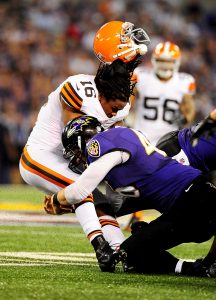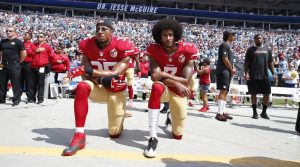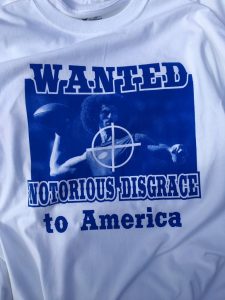It’s not because the Buffalo Bills will be terrible. As a long-suffering fan, I am used to all that the Bills give their supporters–strange draft choices, poor coaching, fluky management, and a game-day environment that all-too-often can resemble an afternoon on the Ice Planet Hoth but with way more shitty, over-priced beer.
In part, it is because of the increasing evidence of the danger of the sport. Years ago, both of my sons played football in high school. Today, I would try to persuade them to do something else. There is something truly disturbing about supporting a “game,” or business, that produces thrills and excitement to be sure, but also broken bodies and damaged brains. The NFL has made some token gestures to try to make the sport more safe, but it does not seem like they have done enough. Maybe they can’t do much. Maybe it is only a matter of time, as Arizona Cardinals Quarterback Carson Palmer once said, before a hard hit kills a player on the field. Wonder what the League’s contingency plan for that event is. Would you be surprised if the game went on? Cart him off, stick him on ice, and snap the ball.
Partially it is the treatment of former San Francisco 49er quarterback Colin Kaepernick, who has been blackballed by NFL owners and management for first dec iding to take a knee during the National Anthem in support of the Black Lives Matter movement. His protest was respectful and never “disruptive.” His teammates said he never was a “distraction.” Kaepernick is not a bad guy, and he has put his money behind his actions, supporting parolees, for instance, by giving them new suits. His treatment by the NFL is appalling. I have never played football, but I refuse to believe he is a worse player than some of the 70
iding to take a knee during the National Anthem in support of the Black Lives Matter movement. His protest was respectful and never “disruptive.” His teammates said he never was a “distraction.” Kaepernick is not a bad guy, and he has put his money behind his actions, supporting parolees, for instance, by giving them new suits. His treatment by the NFL is appalling. I have never played football, but I refuse to believe he is a worse player than some of the 70  some quarterbacks who will be on NFL rosters when the season begins in a couple of weeks. I mean, have you watched the Jets? Jeez. And I know the Bills could use him. He is like Tyrod Taylor, only tall enough to see over the defensive line. The political conservatism of the NFL is notorious, and its persecution and punishment of Kaepernick absolutely infuriates me.
some quarterbacks who will be on NFL rosters when the season begins in a couple of weeks. I mean, have you watched the Jets? Jeez. And I know the Bills could use him. He is like Tyrod Taylor, only tall enough to see over the defensive line. The political conservatism of the NFL is notorious, and its persecution and punishment of Kaepernick absolutely infuriates me.
And, in part, it is the NFL’s unwillingness to do anything at all about the Washington football team’s use of a racial slur as its team name. Several years ago, I wrote an editorial which appeared in an Albany newspaper about the R-skins logo. At the time, I honestly believed some progress was being made, that market forces and adverse decisions in the federal court system would increase pressure on or eliminate trademark protection for the team. I wrote that “the Redskins name should go and likely will as pressure mounts on Redskins owner Dan Snyder and the NFL from prominent athletes, U.S. senators, native peoples, the general public, and most recently [Hilary} Clinton. The team will continue to protest. Its lawyers, predictably, will continue to fight. But it is only a matter of time. The mascot issue is a problem where the solutions can come easy, and it is an issue that growing numbers of non-Indians support.”
But I also felt in 2014 that it was an issue of less consequence than many of the others facing native peoples.
Forcing Daniel Snyder to change his team’s name likely will do little to help solve the significant problems facing native nations. While a growing number of non-Indian Americans have joined in efforts to counter offensive Native American mascots, they pay too little attention to more difficult issues that affect the lives of millions of Native American people.
Too many Indian communities, for instance, continue to struggle to enjoy the measured sovereignty permitted them by the most anti-Indian S
upreme Court in American history. State and local governments mount aggressive campaigns designed to skim the cream off of the fragile prosperity that has emerged in some native communities, looking to tax gaming and retail businesses located on Indian land in opposition to a constitutional logic that has stood for almost 190 years. They challenge American Indian tribal sovereignty, and the pressure at times is relentless
Meanwhile, Native Americans have lower life expectancy, higher rates of death from cancer, injury and suicide, and are more likely to be poor, unemployed, and the victims of violent crime than their non-Indian neighbors.
These other problems facing Indian country are more vexing, the solutions more elusive, than abandoning a team nickname. What is to be done about poverty and unemployment and a lack of opportunity in Indian communities, all the bitter fruits of colonization and subjugation? What can be done to restore lands taken illegally, or for a fraction of their real value, from native peoples? What to do when federal courts have limited the religious rights of native peoples to worship as they so choose, and curtailed other freedoms as well?
I still feel that way, but the stubborn protection of the team’s name by the league and owner Daniel Snyder is deeply troubling. The R-skins helmet insignia draws upon images from the Native American past. Ask any non-native person to recite to you the images that come to mind when you say “Native American” or “American Indian.” What images will come to their minds? They will speak of images from the past, of leather, feathers, and beads. Snyder and many of the team’s fans assert that the name honors native peoples. Please. His is a patently stupid argument. By casting native peoples as part of the past, even if doing so was not meant to offend, it becomes easier to deny the just grievances of native peoples today. No group of people in North America spends more time justifying and explaining their existence to white people as do Native Americans. In the NFL, players can be fined for twerking. They can be fined for pretending to slice the throat of an opponent, or for pretending to fire an arrow. But the NFL does nothing about a team nickname that depicts native peoples as savage and warlike, and feeds upon long enduring racist stereotypes.
I am surrounded by delusional Bills fans, those who despite all evidence expect the team to somehow end a playoff drought that is older than three of my children. Like a burning car on the side of the road, it is sometimes difficult not to watch the Bills. Despite my best intentions, I may find myself watching a portion of a game. But I will no longer be able to do that with a clear conscience.
